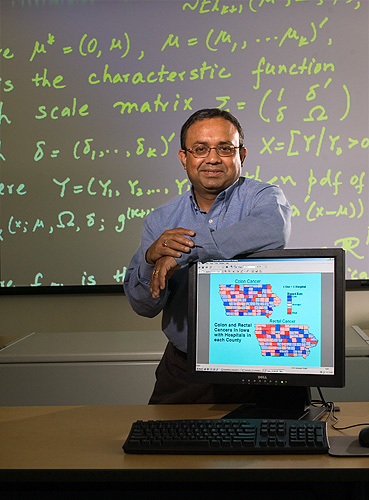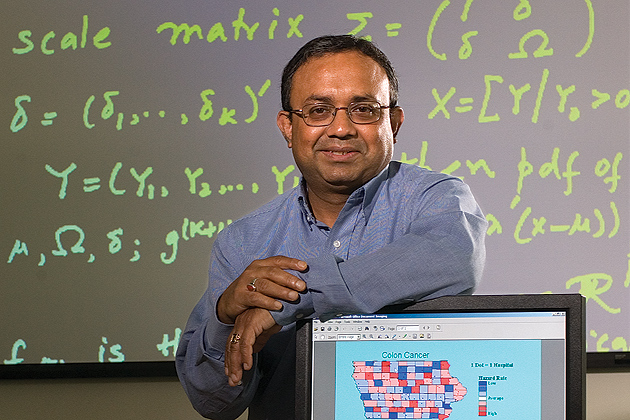
Dipak Dey, Board of Trustees Distinguished Professor of Statistics and associate dean in the College of Liberal Arts and Sciences, has been called an ambassador for the field. A prolific researcher, he is best known for his contributions in the areas of statistical decision theory and Bayesian statistics.
A Fellow of both the American Statistical Association and the Institute of Mathematical Statistics, he is also recognized for developing and maintaining collaborative research programs with other departments and organizations. He recently sat down to answer questions about his field.
We’ve all heard the saying, “Statistics don’t lie.” Yet it’s not uncommon to see statistics misused to prove a point. As a statistics expert, does this frustrate you? And how do you respond?
Statistics do not lie, but sometimes researchers do by misusing and misunderstanding. Sometimes people try to misuse statistics to get across a particular agenda. As a discipline, statistics is a sound science and is being prominently used in all disciplines. Unfortunately statisticians and scientists can’t control how others with a specific agenda may or may not misuse the sound principles and paradigms for their personal benefit.
Data can often be manipulated or ignored to come to a specific conclusion, but that in and of itself is not a reflection on the theory and modeling used in the field. The situation is similar to misusing any kind of legitimate system for one’s personal agenda. People are warned against doing such things, but every year we hear about some powerful interests misusing statistical data to prove a specific point. This is unfortunate and indeed frustrating. In case of such cases, are the principles of statistics at fault? We need to think before we answer.
Personally, I feel happy and proud to know what statistics is about, and how it helps society and life as a whole. After, all knowledge is golden. So I keep learning through the knowledge that can be acquired through the regular use of statistics.
Why should we all know more about statistics?
We all need to know more statistics because it is the science of using data in all fields and disciplines to determine and draw true conclusions about the world. The knowledge gained from statistics is used regularly in technology, business, economics, medicine, social science, and can be related as fact-based knowledge to help people’s daily lives.
What are statisticians doing to expand the public’s understanding of statistics and how they are used?
Besides teaching statistics at the educational level, statisticians have now joined various government agencies, nonprofit organizations, corporations, and other sectors in everything from technology to fashion. As I mentioned before, the discipline of statistics is used in virtually all fields. Whether it is for the analysis of polling data for politics or the analysis of air and water quality for the environment or the analysis of cancer data for smokers, statistics plays a key role in gaining fact-based knowledge. Specifically when it comes to the example of our government, where the decisions being made impact all citizens of the country, statisticians are playing determinative roles in the Food and Drug Administration, the National Institutes of Health, the Census Bureau, the Bureau of Labor Statistics, the United States Department of Agriculture, the National Center for Atmospheric Research, the National Institute for Environmental Research, the National Institute for Educational and Health Statistics, etc.
What role do statistics play in the public debate about an issue, such as what governments should do to deal with climate change?
Statistics play a major role in the public debate about various issues, often controversial issues. Fact-based data gathered through surveys and opinion polls often determine how much support the government has toward a specific point of view or agenda. Statistics can be used to model and track climate change through scientific data. Similarly, statistics can be used to determine how people feel about certain scientific conclusions. Statistics can be used to both refute and support specific claims. Many debates are resolved by using appropriately designed models to demonstrate a point. Many agencies, e.g. Gallup and Westat, are taking polls on major issues from the public. The Roper Center at UConn is a major archive that maintains a huge database of public opinion about science, economics, and government matters. The government constantly turns to statistics to gauge the way to make policy.
What the government should or wants to do in regards to climate change is based both on public opinion statistics as well as various fact-based expert opinions from scientists. Climatologists, for example, often extensively use statistics in risk analysis and extreme event modeling to factually measure climate change. They draw conclusions based on the detailed statistical analysis.
Why should students who are considering a major pick statistics?
The two primary reasons would be a love for science and, arguably more important, the need for a fruitful career. The job market in statistics is flourishing at a rapid pace. One North American job website recently published its 2011 job ratings where they ranked “statistician” as the fourth best job of 2011. Statistics as a field is extremely popular in all sectors, and its popularity and the need for statisticians will only grow. A statistician’s talent is needed virtually everywhere and most students should have no problem finding a job post-college. A statistics major has the choice to join various sectors, as I mentioned before, ranging from sports to the government. With a BS or BA in statistics, students can also choose to pursue higher education in a specialty fields such as biostatistics, bioinformatics, computational statistics, actuarial science, financial statistics, etc.
What are some of the career paths for statisticians now that didn’t exist a few years ago? And what types of jobs do your graduates get?
There are many career paths for today’s statisticians. Many of them evolved due to the cutting-edge development of computers that didn’t exist in the past. These include but are certainly not limited to opportunities in pharmaceutical companies, market research firms, biotech companies, insurance industries, and the government. The job prospects are endless and yet to be fully determined.
This article was first published on UConn Today on May 16, 2011.



